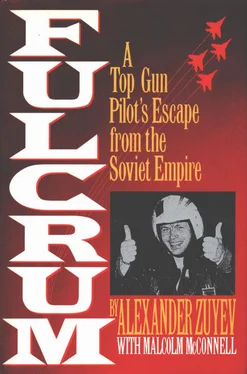I actually felt my left fist close on the throttle knobs and my right index finger slide onto the radio call button on the control stick. It would be so easy. For a moment I hung there in the clear winter sunlight, balanced as if on a pivot. Then I recalled the NATO code name for the MiG-29, “Fulcrum,” tochka opori. How appropriate. At this instant my life and this top-secret Soviet aircraft were indeed balanced on a fulcrum.
Then, from nowhere, I heard the words of the Military Oath of Loyalty I had taken as a brand-new cadet on Armavir’s sunny Lenin Square eleven years before. After swearing to defend the Union of Soviet Socialist Republics with courage and discipline, “until my last breath,” I had chanted the final phrase of the oath, my unwavering voice joining those of the three hundred young men around me.
“And if I should break this solemn oath, then let me suffer the severe penalties of Soviet law and the universal hatred and contempt of the Soviet people.”
As a kursant of seventeen, those words had stirred a deep emotion. My loyalty to the Soviet State had been unshakable. I had firmly believed that the Soviet Union, led by its Communist Party, was the most progressive and humane nation in history. And if young men like me defended that State and its Party, the Soviet Union would lead the suffering peoples of the world to a new dawn of harmonious prosperity. I had loved my country and my people. And I had been absolutely certain that nothing could ever make me betray them.
Now, as a First Class pilot captain in the Soviet Air Force, I was a different person. I now understood that the Soviet State, manipulated by a tiny clique of corrupt Party criminals and their accomplices in the military and “Organs of State Security,” maintained the cruelest and most repressive system in human history. But my loyalty to my people had not changed. The final phrase of the oath still bound me.
Suddenly my radar-warning receiver beeped and the forward right quadrant flashed with green and yellow. Shatravka’s search radar had just swept us. From the band of intensity lights, I knew he was still at extreme search range, too far for a lock-on. But our two flights were closing fast. With Nikolai tucked up so close, we were presenting only a single target echo on both airborne and GCI radar. And I hated to relinquish this advantage too soon. But in a closing engagement with radar-homing missiles as the initial weapon, a pilot who stubbornly tried to retain a minor perceived advantage would not survive very long. The Alamo accelerated to Mach 5 and was damned hard to shake.
Suddenly Nikolai’s voice sounded in my earphones. “Na mnye. He’s got me.” Shatravka’s radar now had a solid lock on Nikolai’s aircraft. It was time to split our flight.
“Nachalie,” I ordered Nikolai. “Let’s go.”
I chopped the throttles back to idle, pulled the stick hard left, and hit the air brakes. The fighter rolled onto its left wing and dropped toward the sea. As I fell, I looked quickly back over my right shoulder to see Nikolai banking hard right in a fast, high-G break at our original altitude of 15,000 feet.
By turning perpendicular to the threatening Doppler radar, Nikolai and I hoped to break Shatravka’s lock-on before his computer authorized missile launch. Doppler radar depended on differential speed to generate a target. We had abolished that speed by turning hard right and left, perpendicular to the enemy radar. If Nikolai could keep this angle for twelve seconds, the logic memory of Shatravka’s radar computer would be overpowered and the lock-on broken.
My own gambit was a variation of this tactic. As I dove west, I would be invisible to Shatravka’s Doppler radar. And I knew that the GCI radar used by his battle-control officer had a seven-second scan sweep, and that two complete scans were required to register a solid target blip at this range. So, if I could be down below the GCI radar horizon within fourteen seconds and maintain my own perpendicular aspect to the enemy flight, they would have lost me. And when they picked up Nikolai again, they would naturally assume that blip represented both of us, still flying tucked-up tight. Air combat was not a gentleman’s sport. You had to be deceptive to survive.
Ten seconds later I slid my throttles forward to eighty percent and pitched up to slow my rate of descent at the official minimum maneuver altitude of 1,800 feet. I sagged in my seat. The rubber bladders of my G-suit inflated, squeezing my belly and thighs to keep the blood from rushing away to my legs and causing gray-out. But today I planned to go much lower to avoid radar detection.
I pushed the throttles to ninety percent and eased the nose over. In a moment I was down on the deck, only 600 feet above the softly rolling blue swell of the sea. Now I was invisible to both Vitaly and his rival controller’s radars. And Shatravka was too preoccupied searching for Nikolai up at 15,000 feet to sweep for me down here. That was my game plan, which also included using the sun to mask my position. Because on these clear winter afternoons, anyone flying low to the west was difficult to see against the glinting surface of the water.
My airspeed had now hit five hundred knots and I swung onto a northeast heading of 050 degrees. After forty seconds I pushed the throttles to full military power and pitched back to a steep gorka climb. I turned my oxygen control to full pressure, 100 percent, pure oxygen. In the high-G dogfight I expected, I would need all the oxygen the system could deliver to prevent diminished vision. Again, my G-suit hissed as the bladders inflated hard against my midsection. Now I turned my radar modes switch from “standby” to “illuminate.” My HUD lit up with a swarm of parallel white lines, electronic glowworms marching to the commands of my radar computer. These were target blips, most of them false returns. The radar quickly sorted through the clutter to reveal an authentic target block on a bearing of 010 degrees, ten miles ahead, at least 6,000 feet above me.
That was either Shatravka or his wingman, or both. I hoped they were still searching for Nikolai’s bait.
The rectangular radar cursor jumped from one group of glowworms to another, and finally settled on a fast-moving blip crossing from left to right. I was climbing a bit too steeply for easy visual acquisition, so I had to strain forward against the Gs to peer around the HUD. There he was, a gray dart, sweeping straight and level to the south at 12,000 feet altitude. I saw no flashing navigation strobe and knew the target was not Nikolai.
On the inner throttle knob, I clicked the white button to activate the radar lock-on system. Once the radar computer calculated the target’s course and speed, the data would be fed to the Alamo missile’s radar-seeking nose sensor. The computer would interrogate the entire system for verification, and the friendly, synthesized female voice of “Rita” would sound in my earphones announcing, “Pusk razrayshon. Launch is approved.”
When we had received our new aircraft, four years before, Rita’s voice had been a scratchy monotone, hardly the sexy companion most pilots wanted. So we had asked Natasha, one of the maintenance dispatchers, to rerecord all the announcements of the female voice warning system. She had the sweet voice of a television star. Now as I topped 9,000 feet, I heard Natasha’s recorded voice announce, “Launch is approved.”
I flipped over the missile trigger to arm it and squeezed off two simulated Alamos. I wasn’t squandering weapons. If you launched only one of the big missiles, the unbalanced load on your wing pylons limited your dogfight maneuverability to a maximum angle of attack (AOA) of only fifteen degrees. I wanted a full twenty-four-degree AOA when I mixed it up at close range.
Читать дальше










